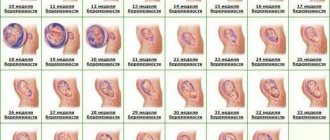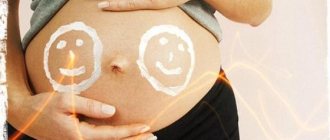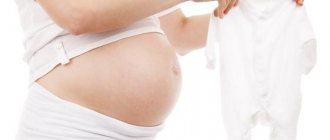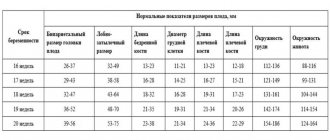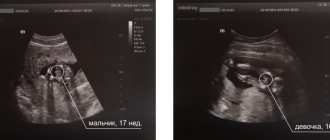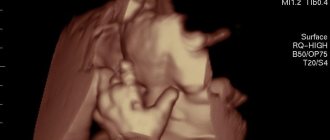Photo: UGC Carrying a child is a difficult psychological and physiological period in a woman’s life. Toxicosis, hormonal surges and declines, fatigue and drowsiness of the first trimester recede as soon as the 14th week of pregnancy begins. This is the beginning of the second trimester, which brings new sensations and challenges. Let us tell you in more detail what the expectant mother needs to know about this period.
Body changes and new sensations for women
Some expectant mothers in the second trimester complain of low blood pressure during pregnancy, and this also applies to those women who, before the “interesting state,” did not even know about the existence of such a problem. The reasons for the decrease in blood pressure have not been fully studied by doctors. Very often, hypotension at 14 weeks is easily tolerated by pregnant women, however, with a significant decrease in pressure, the help of a specialist is necessary. After all, hypotension can lead not only to severe headaches, but also to fainting. In addition, at such moments, the mother’s body is less well supplied with blood, which means that the child receives significantly less oxygen, which can become a threat to the normal functioning of his brain.
What's happening
By the end of the 14th week of pregnancy, the fetus will reach about 12.5 cm in length and weigh between 35 and 45 g.
At this stage, not only the motor, but also the facial activity of the child increases: he yawns, grimaces, smiles. The baby's face becomes more perfect: the eyes come closer together, the ears take their place, the cheeks, nose, forehead, bridge of the nose and eyebrows emerge clearly. The body and head are covered with delicate fluff.
By 13–14 weeks of pregnancy, the pancreas and thyroid glands are already producing hormones, and the liver is producing bile. The kidneys and ureters secrete urine, which ends up in the amniotic fluid, but don’t worry: this is not harmful to the baby, because the amniotic fluid is constantly renewed. Also, at the 14th week of pregnancy, the fetal genital organs continue to improve: in boys, the prostate develops, and in girls, the ovaries descend from the abdominal cavity into the groin area.
The baby's muscles are becoming stronger. The bones are still soft and made of cartilage, but gradually they will begin to harden. During this period, training of the respiratory system continues: the fetus inhales the amniotic fluid and pushes it back out. The child feels the taste of amniotic fluid; Moreover, he has already developed his own taste preferences, and he clearly reacts to sweet, sour or bitter.
Although by the 14th week of pregnancy the composition of the blood has not yet formed, it is already possible to determine its group and Rh factor. And the baby’s heartbeat can be heard even with a regular stethoscope.
Nutrition at 14 weeks of pregnancy
Now the baby is actively moving in his mother’s belly - this is how he develops his muscular system. Therefore, it “demands” as much protein as possible from the mother for the development of muscle fibers. As a result, a woman may be haunted by a constant feeling of hunger and a desire to snack. Of course, you can’t refuse nutritious food, but an expectant mother shouldn’t overeat (proper nutrition during pregnancy means varied, high-quality, fresh food in moderate quantities!). What foods contain protein? This is meat (dietary meat dishes are more suitable for pregnant women), seafood and fish (shrimp, crab, salmon, cod, trout), milk and dairy products, as well as eggs and cheese.
Screening
A comprehensive screening test is prescribed in each trimester of pregnancy to assess developmental defects (genetic and chromosomal pathologies). The optimal time for its implementation in the first trimester is 12-14 obstetric weeks. It is during this period that ultrasound can easily determine the presence of Down syndrome and Edwards syndrome - irreversible chromosomal pathologies - based on the state of the collar zone. Second trimester screening is carried out at 15-20 weeks of obstetrics.
In addition to ultrasound, as part of screening, a double test is performed to determine the content of hCG and a specific protein in the blood serum. Elevated values provide grounds for in-depth examination of chorionic villi, placenta or amniotic fluid.
Lifestyle
Despite the improvement (compared to the first weeks of pregnancy) in health, women should be very careful and not risk the health of their babies. This is especially true for those pregnant women who prefer to lead an active lifestyle (if the mother correctly calculates her strengths and capabilities and approaches every task wisely, there is, of course, nothing wrong with that!). Thus, doctors advise women who continue to drive a car even during an “interesting situation” to purchase special seat belt adapters for pregnant women - they allow you to reliably move a regular belt down your rounded belly, eliminating any pressure during sudden braking of the car. This way you will save yourself and your baby from many troubles. In addition, during the journey, pregnant women should periodically stop and rest. And don’t forget to tell your loved ones where you went and when you plan to return home!
Preparing for an ultrasound examination: what to expect and how to prepare
Many pregnant women are afraid that this study may somehow harm the unborn baby, they are wary of the upcoming procedure, they are nervous, which actually harms both themselves and the child. There is no scientific evidence of the harmful effects of ultrasound, although specialists have carried out a lot of work in this direction. Prejudice is not a reason to refuse a truly important and necessary procedure.
This study does not require special preparatory measures. The only BUT: when pressing on the abdomen with a sensor, a feeling of discomfort may occur in the case of a full stomach or bladder. Therefore, before the procedure you should not eat heavy food or drink a lot of water. In some cases, particularly with a low position placenta, a full bladder may be required, so bring a bottle of water just in case.
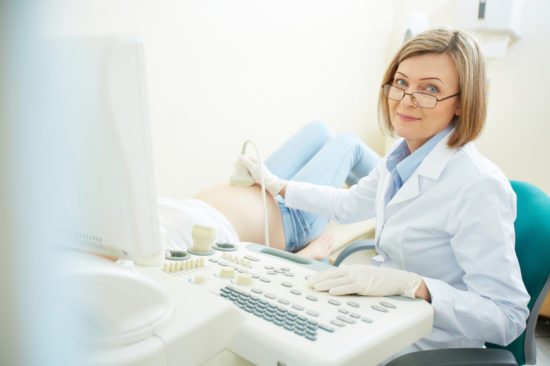
For the procedure you will need to take:
- A disposable gynecological diaper to cover the couch with. A regular towel will do.
- Shoe covers or replacement shoes.
- Sterile gloves and a special condom for ultrasound (if you are scheduled for an intravaginal examination).
- Wet wipes to remove residual gel from the abdomen.
This list is relevant for those who are undergoing the procedure in a antenatal clinic. If you resort to the services of private clinics, then you do not need to take anything with you, all this is already included in the cost of the services provided.
Beauty and accessories
Now is the time to consult with your doctor about a bandage - it will provide support for a small, but already quite noticeable (after all, you are already 14 weeks pregnant!) tummy.
As for how to care for your skin during an “interesting situation,” do not forget to purchase special anti-stretch mark creams for the abdomen and chest. Or you can simply rub olive oil into your skin - this is an excellent and inexpensive remedy. Masks made from strawberries, kefir, yogurt, as well as cucumber juice will help in the fight against pigment spots on the face that suddenly appear against the background of hormonal changes.
Risk factors
Although at the 14th week of pregnancy the main risks for the baby are over, high temperature at this stage can cause the development of serious complications. Colds are especially dangerous when the thermometer shows 38 degrees or higher. Therefore, at the first symptoms of the disease, you should definitely consult a doctor - it is necessary to treat a cold.
However, temperature can accompany not only a cold, but also various infectious diseases (toxoplasmosis, influenza, rotavirus infection), inflammation of the respiratory tract (pneumonia, bronchitis) and urinary tract (pyelonephritis and cystitis).
If a high temperature at a period of 13-14 weeks lasts for a long time, fetoplacental insufficiency may develop - a complex of disorders in which complications such as the threat of miscarriage, delayed fetal development, hypoxia, etc. arise. Therefore, self-medication is unacceptable.
If immediate contact with a specialist is impossible for some reason, try to bring down the temperature. To do this, you should do a rubdown, and in extreme cases, you should take a drug based on paracetamol. If after this the high temperature persists for several hours, hospitalization is required.
As in earlier stages, at the 14th week of pregnancy you should pay close attention to abdominal pain. Painful sensations can be caused by stretching of the ligaments that hold the uterus. In this case, minor dull pain is localized on the sides of the abdomen and sometimes radiates to the groin, but does not last long. If they appear suddenly, have a cramping nature and are concentrated in the lower abdomen, this may be a sign of uterine hypertonicity, which can lead to miscarriage. If such symptoms appear in the 14th week of pregnancy, lie down, rest and observe your condition. If the pain persists for 2–3 hours, and is accompanied by bleeding, call an ambulance immediately.
What are the main reasons for erroneously determining the sex of an unborn child?
The main reasons for erroneous determination of the sex of a child during ultrasound are:
- Lack of quality equipment;
- Insufficient experience as a doctor or low qualifications;
- Sometimes, during routine examinations, the fetus does not allow one to see its genitals and is in such a position that it is impossible to determine whether it is a boy or a girl.
- During an ultrasound examination, doctors quite often note that during the period when the procedure is performed, the child begins to actively move and determining gender can cause difficulties.
- Often in girls during prenatal development, swelling of the labia occurs, which is not a pathology, but when diagnosing gender, it resembles a scrotum.
- One of the mistakes when identifying the sex of a child is mistaking the umbilical cord loop or fingers of the fetus for the penis.
- Boys can shrink their limbs and become girl-like by hiding their genitals. Such minor fetal movements can mislead the doctor.
- Also, if the pregnancy is multiple and the parents are expecting twins, then the error in determining sexual characteristics increases several times even in later stages. The tightness in the uterine cavity, mobility and frequent contact with the body parts of their “neighbors” do not allow the babies to settle in a position convenient for the doctor.
The structural features of the walls of the abdominal cavity, the thickness of the uterus, the quality of the placenta, polyhydramnios or oligohydramnios, and the location of the umbilical cord at the time of the study affect the reliability of ultrasound results.
Vaginal bleeding
The appearance of a large amount of bloody discharge, accompanied by cramping pain in the lower abdomen, radiating to the lower back, indicates the onset of spontaneous termination of pregnancy.
Possible reasons:
- Placental abruption;
- Fetal development abnormalities;
- Injuries, falls, abdominal bruises;
- Hormonal imbalance.
If you provide a woman with timely medical assistance, you can try to maintain the pregnancy. To do this, you should seek emergency help.
Pain
Often a pregnant woman feels pain in the lower back. This symptom is caused by wearing high-heeled shoes or significant weight gain in a short time. The center of gravity of the body shifts, and the spine cannot quickly adapt to such changes. Dangerous lower back pain associated with pyelonephritis - inflammation of the renal pelvis. Sometimes pain is the only symptom of this disease. Pyelonephritis should be treated under the guidance of a urologist, who should be knowledgeable about pregnancy in order to select safe drugs.
Another reason for negative feelings is headaches. They can be caused by the fact that the vessels cannot cope with the increased volume of blood, sleep disturbances, and overwork. It is advisable to avoid the use of medications; it is better to use rest, massage of the temporal zone, and cool compresses rather than medications.
Mild pain in the lower abdomen may be a symptom of a sprained ligament that holds the uterus. When the tissues adapt to the increased load, these pains will no longer be felt. Much more dangerous is cramping pain in the lower abdomen in combination with profuse sanguineous or bloody discharge. Such symptoms are characteristic of a miscarriage or expulsion of a frozen pregnancy. If the fetus is alive, it is possible to save it by promptly contacting a gynecological hospital.
What foods are good for pregnant women?
Every expectant mother knows that her body should have enough calcium, but not everyone knows why. The thing is that a lack of calcium affects primarily the mother herself. And what about the Kid? Nature took care of him: if there is a shortage of calcium, he will get it “from his mother,” or rather, from her teeth and bones. But this is too radical a method! There are also more appropriate ones. So, for the formation of the musculoskeletal system, the Baby needs:
- Dairy products, butter, cheese. Foods in this group are important sources of fat, calcium and protein. The need for calcium increases especially after the third month, when the baby’s bone growth is in full swing. Research has proven that 2/3 of the calcium and phosphorus contained in the body of a newborn is absorbed by him in the last four months preceding birth. True, you can’t overdo it either: an excess of calcium leads to an increase in the strength of the connections of the child’s cranial plates, which during childbirth can lead to additional mechanical trauma to the brain and spinal cord, and also increases the risk of injury to the tissues of the mother’s birth canal.
- Nuts and seeds. The nutritional value of nuts is ensured by their favorable combination of proteins and fats; Nut protein contains many essential amino acids and lysine, which is very important for a growing body - an element that contributes to the normal functioning of a growing Baby. There is more lysine in nuts than in chicken eggs. 100 grams of nuts per day is enough: hazelnuts, walnuts, pine, almonds. Sunflower and pumpkin seeds, or sunflower seeds, are, like nuts, a valuable source of plant protein. In addition, the plant accumulates much more various microelements in the seeds than in the pulp of the fruit - for future offspring.
- Fish and seafood. Fish is an excellent protein that is easily digestible by the body; in addition, fish contains phosphorus, as well as fish oil. Fish oil is extremely important for the unborn child, as it contains not only vitamins A, but also vitamin D in its natural form. Vitamin D is necessary for the absorption of calcium, the formation of bones, teeth and the normalization of phosphorus metabolism. Fish is much easier to digest than animal meat; it contains many mineral salts.
- Eggs. Eggs are a rich source of proteins and vitamins. Egg yolk contains approximately 10% lecithin, a lot of choline and vitamin A. The norm for consumption of eggs per week is 2-3 pieces (chicken). Quail eggs are very useful.
- Meat and poultry. Animal meat and poultry are a good source of protein, fats and vitamins. The lightest is poultry meat. However, most of the iron Baby needs is found in lamb and beef. General requirements for meat: lean, fresh (fresh meat that has not been repeatedly defrosted and frozen), baked, stewed with vegetables, boiled.
